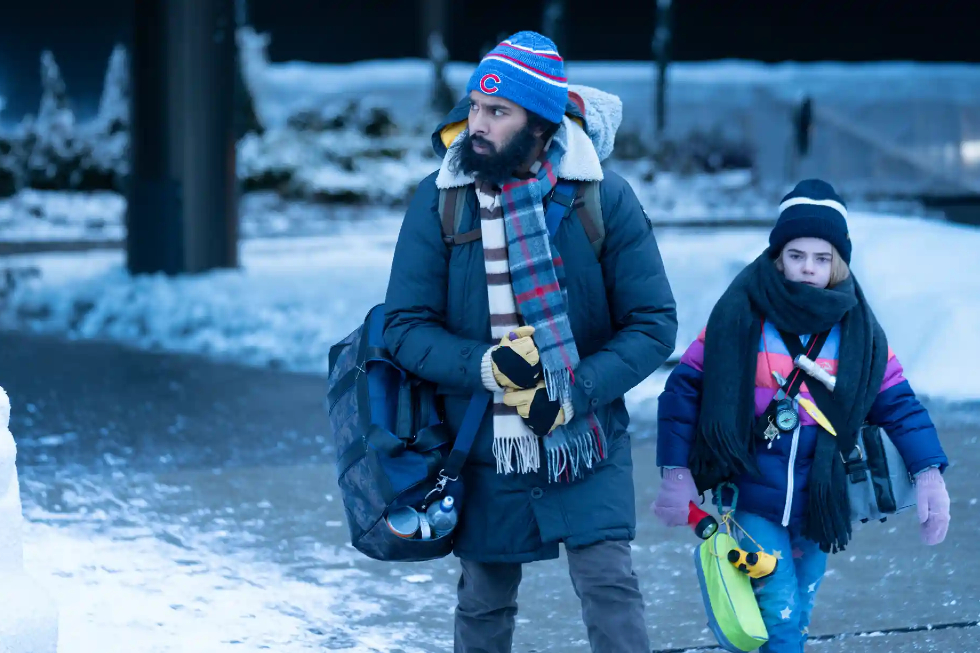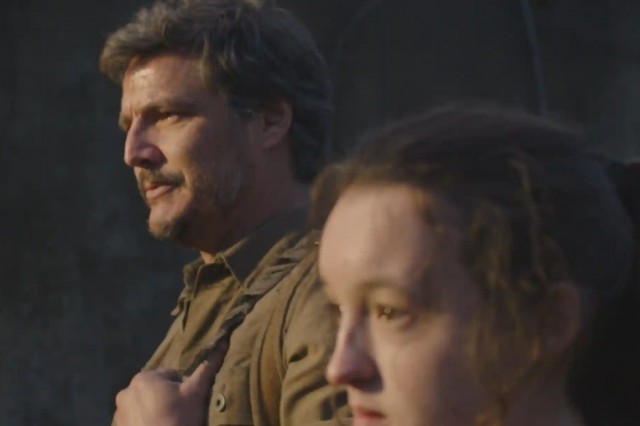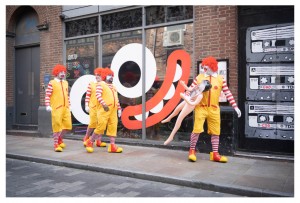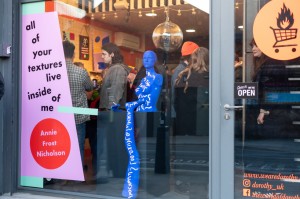Survival Is Insufficient:
Humanity After The End

What makes us human? What, in the face of end times catastrophe, helps keep us that way? Mike Pinnington considers two recent examples of post-apocalypse drama, with mixed results…
Warning: Expect spoilers relating to The Last of Us, and Station Eleven throughout.
If you’ve had any exposure to science fiction – or, indeed, happen to have recent experience of living through a global pandemic – you can probably make a decent stab at envisioning certain aspects of what the world might be like after the end. Perhaps there will be a plague; there is a reasonable chance of zombies; raiders doing unspeakable things to their fellow survivors after dark should be expected; and, of course, various churches of capitalism will rot (although these will continue to wield some kind of sub spiritual pull on the masses).
Among them: empty, decaying shells of shopping malls; chain restaurants; and seats of (western) power. Burnt out wrecks of vehicles, stripped of anything useful, or otherwise, will litter the highways and byways. These will offer ample opportunity for laying traps for unsuspecting travellers to fall into and/or cause fatal bottlenecks in attempted getaway situations.
Popular culture is awash with such visions; so much so that when the end comes, our lived experiences of it might feel like a collection of clichés. To the extent that, in whatever available downtime living in this near future hellscape affords, people will doubtless pass it naming examples of the post-apocalypse made real that had previously only appeared in books, TV show or films.
This is not to say that everything that can be said about the fictional end of the world has already been said. Or, at least, that writers won’t continue to attempt to add to the almost always grim picture. Two recent additions to the genre, especially some of the contrasts between them, have done more than most of late to engender my own thinking around what the end of the world might look like; and, moreover, what our experience of it will be.
One, The Last of Us – set twenty years into a pandemic transforming those infected into mushroom zombies – you will certainly have heard of. Station Eleven, taking place before and after a swine flu pandemic known as the Georgia Flu has wiped out much of the world’s population, you perhaps won’t have. In any case, it’s true to say that the former got a helluva lot more attention than the latter. This is in large part due to the origins of these two titles. Although Station Eleven has been adapted for screen from Emily St. John Mandel’s 2014 New York Times bestselling novel, The Last of Us has its roots in a multimillion selling videogame franchise. Add into the mix the increasingly bankable star, Pedro Pascal, and it’s clear that its success wasn’t so much expected as it was nailed on.

Financial clout and name recognition aside, they have much in common. They each feature scenarios that deal in large part with the aftermath of a near extinction event. Each has at its centre a young, female lead under the protection of an adult male plunged by circumstance into the role. In The Last of Us, this is Ellie (Bella Ramsey) – immune to the infection and, therefore, offering hope in the search for a cure – and Pascal’s Joel, a traumatised and rough around the edges survivor. In Station Eleven, we find child actor Kirsten (Matilda Lawler) and audience member Jeevan (Himesh Patel) serendipitously flung together in the immediate aftermath of a performance of King Lear gone very wrong, as the Georgia Flu takes hold.
But thereafter, comparisons – much like the societies they depict – quickly collapse. The Last of Us, which has gleaned (I must say surprisingly) stellar reviews, I’ve seen labelled as a greatest hits of the post-apocalypse. Such descriptions are apt – it does practically everything those familiar with this genre will have seen before. Often it does these things well enough. But rarely – if at all – does it surprise us. And, worse, it is frequently downright lazy. In one instance, when a stranger asking for help crosses paths with Joel and Ellie, a kind of muscle memory tells us, beyond a shadow of a doubt, that his distress is affected and that this, obviously, is an ambush. In another, in which Ellie is effectively on a date in an old shopping mall with her crush, that the budding romance is stymied by onrushing infected was greeted with eye rolls.
Nevertheless, and despite its modest ambitions, TLoU offers just enough to warrant seeing it through to the end. But that it entertains without ever feeling truly compelling, cannot be ignored; a grab bag of post apocalypse tropes, ultimately, it is all too content to fit snugly within the staid conventions of its genre. Rarely unduly troubling the expectations of an audience grown accustomed to bingeing on what amounts to ambient TV, it seldom aspires to more than it deems necessary. Station Eleven, by contrast – and resoundingly so – does. From the off, while comfortable enough occupying the skin of science fiction, itself leaning into many a convention of the form, it feels an altogether different, frequently transcendent proposition.
Perhaps this stems from author St. John Mandel’s source material, wherein the guiding principle for key players in Station Eleven’s cast of characters is that ‘survival is insufficient’. Borrowed, believe it or not, by the author from an episode of Star Trek Voyager, the phrase points to the fact that – as in the real world – there has to be more than ‘this’ if we’re to more than simply exist. Here, that means art and culture – in all its forms, be it comic books or Shakespeare.
This motto, carried over into the adaptation with gusto, is embodied by the so-called Travelling Symphony (although it manifests elsewhere, too), an itinerant touring company who visit and perform in communities founded amid the chaos of the new world. Among their number is the now twenty-seven-year-old Kirsten, played with mercurial brilliance by Mackenzie Davis. In the intervening years, separated from Jeevan (who she believes is dead), Kirsten has transformed from cute inquisitive kid inspired by graphic novels, writing and acting, into a more ambivalent figure, one not scared to use the dagger she has long kept close in anger.
This ambivalence bleeds through the show, preventing Station Eleven from sinking into cosy catastrophe territory. Given that the show’s narrative differs in some crucial ways, even viewing as somebody who’d read the book, at no point are you allowed the opportunity to get comfortable. This unease is provided, variously (but not exclusively), by a self-declared prophet, his cult and child suicide bombers, encouraging a sense that everybody – yes, everybody – seems to be fair game. So when Kirsten believes that Jeevan has failed to return from a hunting expedition because he’s fallen prey to a wolf, the elements, or both, so do we.
Such uncertainty and doubt about the future, whether that be far off or the next five minutes, allows the belief in the necessity of art – to enrich life and give it meaning beyond what we might otherwise expect – to take hold and not let go. For Kirsten, acting and directing, specifically the works of Shakespeare, matters before and after the end of the world. It isn’t simply something she does. Her existence, relationships, soul even – complex and vividly rendered – are explored, scrutinised and clarified under this lens. Like her ambivalence, this too spills out to infect those around her; in one key scene she succeeds in engineering a highly unlikely reconciliation between a painfully estranged mother and son through some creative casting of Hamlet.
Station Eleven presents opportunities for more than the drudgery of mere existence as portrayed elsewhere. It provides reasons to gather beyond seeking warmth. It encourages the unspoken to be aired and, sometimes, wounds to be healed (or picked at). It tells us that even at the end of the world, humanity is worth it, life is worth it. There is room for hope. And, fundamentally, it reminds us in the here and now, that survival is insufficient.
Mike Pinnington
Images: Station Eleven/Starzplay; The Last of Us/HBO





